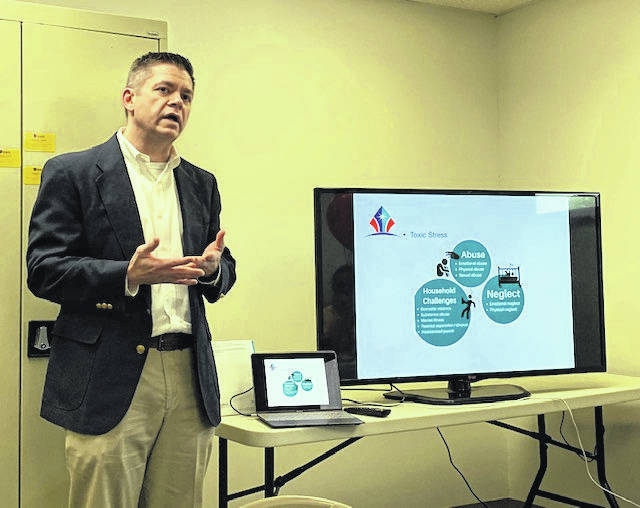
TROY — The Recovery and Wellness Center of Troy hosted a launch event on Tuesday for its ARKlight Center for Childhood Trauma and Recovery.
According to RWC Chief Medical Officer Phillip Hash, ARKlight is Ohio’s first and only community mental health clinic targeting the effects of childhood trauma.
“What we’re looking to do is provide comprehensive trauma recovery services to children and adolescents,” Hash said. “Through RWC as our community mental health provider, our targeted outcome is psychological, physical, and genetic trauma recovery, irrespective of the type of patient environment that they’re coming from.”
Hash discussed the idea that there are three types of stress: positive, tolerable, and toxic.
“Positive stress occurs in all of our lives; this is the type that we recover and develop resilience from,” he said.
An example of positive stress in a child’s life, Hash said, is being told they must wait until after dinner to have a cookie, teaching them patience and other positive values.
“Tolerable stress is serious in nature, but temporary, and as long as you have supportive relationships you can recover from it,” he said.
An example of tolerable stress is a child being involved in a car accident; while this is a traumatic experience, with the right support and care they should be able to recover well.
“What differentiates toxic stress from these other two types is that it’s prolonged and keeps our stress system within the body and brain activated over a long period of time,” Hash said.
This long-term stress, Hash said, has negative impacts on the immune system and can create lifelong effects including higher chances of addiction and an increased susceptibility to diseases like heart disease and cancer, along with memory and learning difficulties, and even early death.
“We’re trying to help kids who have been subjected to a high amount of toxic stress,” Hash said. “Toxic stress could include abuse — emotional, physical, or sexual; neglect; and household challenges like domestic violence, substance abuse by parents, mental illness of other family members, or parental separation for any reason.”
Hash also introduced how the center intends to use evidence-based trauma and screening tools based on Adverse Childhood Experiences (ACEs).
The ACEs, or areas of trauma that the ARKlight Center will focus on, include psychological abuse, physical abuse, sexual abuse, emotional neglect, physical neglect, loss of a parent, mother treated violently, substance abuse, mental illness, and criminal behavior in the household.
“We measure these ACEs by having the child’s guardian fill out the ACE survey for them, which gives a score of zero to 10 and we do the same for the biological parent,” Hash said.
Biological parents are asked to fill out the ACE survey, Hash said, because of the genetic implications to long-term toxic stress.
“Above our DNA, we have an epigenetic layer that is affected by our environment,” he said. “Depending on what we’re facing, what we’ve seen is that, over the course of prolonged stress, that epigenetic center changes and it’s not just for the parent or individual. Most of the studies done on this topic have shown that this epigenetic layer is passed from one generation to another.”
What this means, Hash said, is that even if a child has not directly experienced toxic stress, if a biological parent had experienced a lot of trauma, the impact doesn’t end with them and is instead passed on genetically to the child.
Hash said there are evidence-based remedies to treat the effects of long-term toxic stress, including individual or family therapy, sleep, exercise, nutrition, mindfulness, and healthy relationships, as well as appropriate and conservative medication if needed.
“Therapy is the number one thing, at least in my mind,” Hash said. “Getting better in the long run requires changing the way that we think and that’s where therapy is so valuable and it’s something that no pill in and of itself will ever do.
“I truly believe (medication) can be part of a solution, but it is a very small part,” Hash continued. “When we do medicate, we want to be very conservative with it. We have to understand that these kids are not just little adults and they don’t respond to medications exactly as adults do, so we have to be careful about what we put in their bodies.”
RWC CEO Cynthia Cook-Wion noted that the ARKlight services will be available across multiple counties in midwest Ohio.
“This agency has facilities in Darke, Miami and Preble counties,” she said. “So the young people in all three of these counties are going to be able to access a really amazing, specialized level of care through Dr. Hash’s new program.”
There is currently immediate availability within the ARKlight program, and RWC accepts most insurances, including Medicaid and Anthem. For questions or inquiries, call (937) 423-3432.


